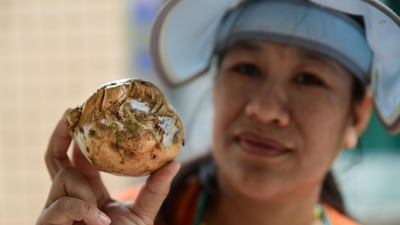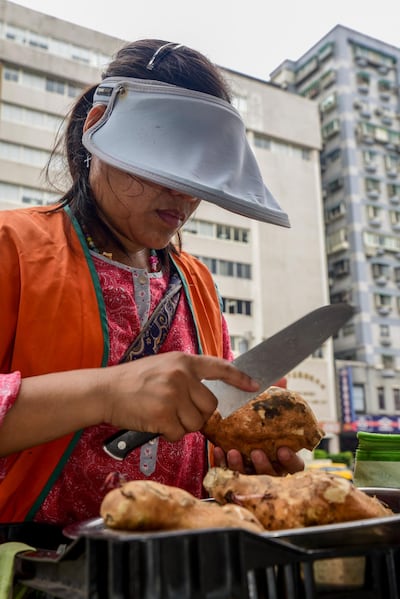Da Zeng couldn’t stop laughing at me. “You’re so tall, perfect for this job,” the Taiwanese woman told me as I used my 197-centimetre height to hold a sweet potato above a crowd of pedestrians in downtown Taipei. In terribly broken Mandarin, I was encouraging people to buy this freshly roasted snack.
The sweet potato mama
I soon did my first deal, earning a thumbs-up from my mentor Da Zeng, a single mother who's surviving the coronavirus pandemic thanks to these potatoes. In Taiwan, Da Zeng is what's called a "sweet potato mama".
That’s also the name of this successful social welfare initiative, through which underprivileged single mothers in Taiwan get free access to portable ovens for roasting sweet potatoes, one of the territory's favourite snacks.
The twist is that these women make extra money by inviting tourists to work with them, offering travellers an unusual and immersive Taiwanese experience for a fee of $43 per person.
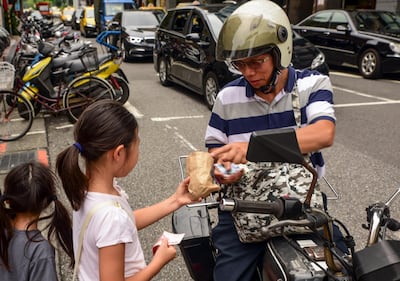
While my trip to Taipei came before the pandemic, the sweet potato mama project has continued to support these women through the global crisis.
Taiwan has done a remarkable job of containing Covid-19. Despite a population of 24 million people, it has registered fewer than 12,000 infections during the entire pandemic.
Countering Covid-19
This success is largely down to tough government policies. Taiwanese residents who’ve returned to the territory during the pandemic have had to do long, mandatory quarantines on arrival, while Taiwan has been closed to tourists for more than a year.
The absence of foreign travellers has seen the daily revenue of the potato mamas drop by at least 20 per cent, according to Shirley Fang, spokeswoman for Topology Travel, which arranges the tours. Ms Fang says the early months of the pandemic were particularly tough for the mothers involved in the initiative. Taiwan was in varied states of lockdown during that time, so they had been restricted in their work.
Over the past nine months, however, Taiwan has allowed almost complete freedom of movement for its people, so these women have been busy. There are 20 sweet potato mamas in Taipei and about 50 across Taiwan. This initiative was started just over a decade ago by Taiwan’s Genesis Social Welfare Foundation.
Building small businesses
Genesis gives the sweet potato mamas free access to portable potato roasters, which they wheel around the city, as well as a couple of bags of free potatoes when they first join the programme. After that, they only pay for the raw potatoes.
Ms Fang says the programme not only teaches these single mothers how to establish a small business, but also gives them flexibility, as their children are allowed to join them as they work.
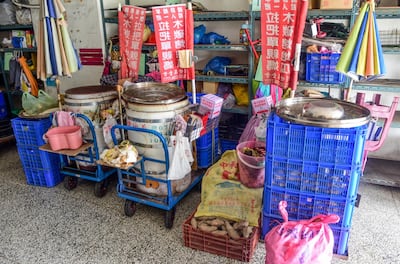
The women also receive a generous cut of the fee paid by participants in the two-hour "sweet potato mama tours" offered by Topology and several other Taiwanese travel companies.
Potato tours
During my eight years as a full-time travel journalist, this tour has been one of my most unique experiences. I met Da Zeng and the three other participants in this tour – a Singaporean woman and her two young daughters – at a small warehouse in central Taipei, where we collected the roasting device and some sacks of potatoes. As we walked towards the street-side location where she intended to sell, I began to learn about Da Zeng via an interpreter, tour guide Tess Yeh.
Da Zeng is one of the programme’s resounding success stories. The second woman to join the initiative, her only child was just 1 year old at the time. Without the support of a husband, she feared she would not be able to properly look after her child. More than a decade later, Da Zeng makes a liveable and steady income from selling roasted potatoes, and her child is in junior high school.
Basic treats
Da Zeng’s experience was immediately evident as we set up her stall next to the entrance of a busy subway station. With nimble fingers she cleaned and cut the potatoes at a roaring speed. Next, she dumped some of them into the drum-shaped, coal-fired oven. Then it was my turn.
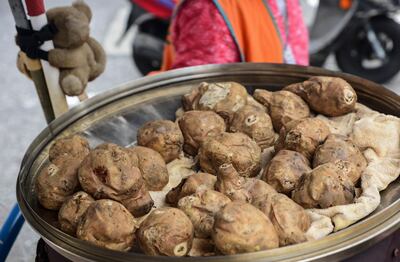
There I was, on a street corner, bellowing “di gua hao chi”, which translates as “sweet potato is very delicious”. My loud, persistent efforts prompted many smiles from amused passers-by. Soon we had a steady stream of customers. Some asked for their potatoes to be peeled, others preferred to eat them skin and all.
These roasted potatoes are the simplest of snacks – consumed with your hands and without added sauce. This basic treat has been popular in Taiwan for more than 400 years, and during my two-hour tour, we sold dozens. As we parted ways, Da Zeng gave me one final thumbs up.
When Taiwan finally reopens to tourists, I hope to join Topology’s other social welfare tour. Run in conjunction with non-profit organisation Homeless Taiwan, this programme lets homeless people in Taipei earn money by showing tour participants parts of the city they know well, while sharing their own experiences and back stories.
Tourism has the power to change lives in Taiwan. And the charming sweet potato mama, Da Zeng, is concrete proof of that.
